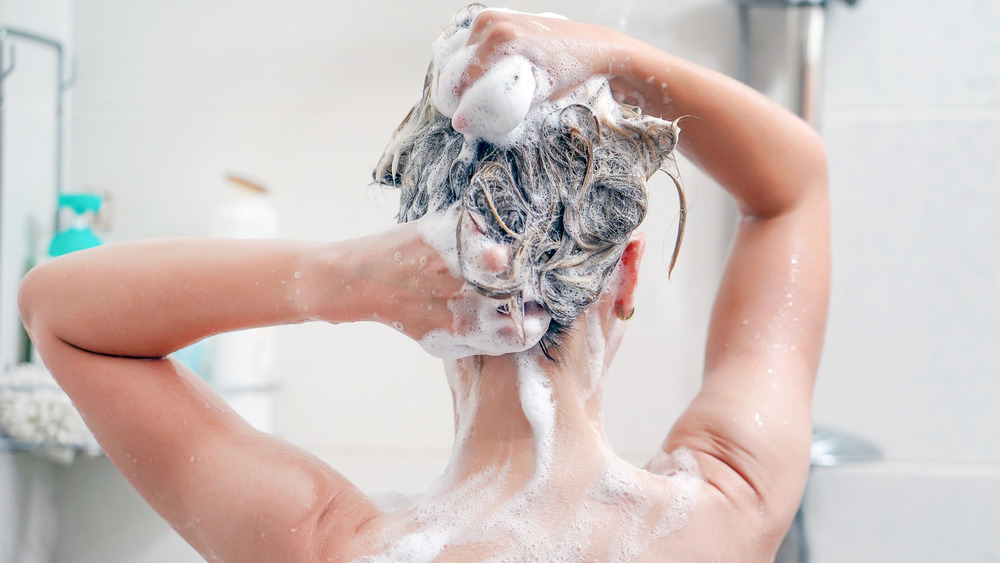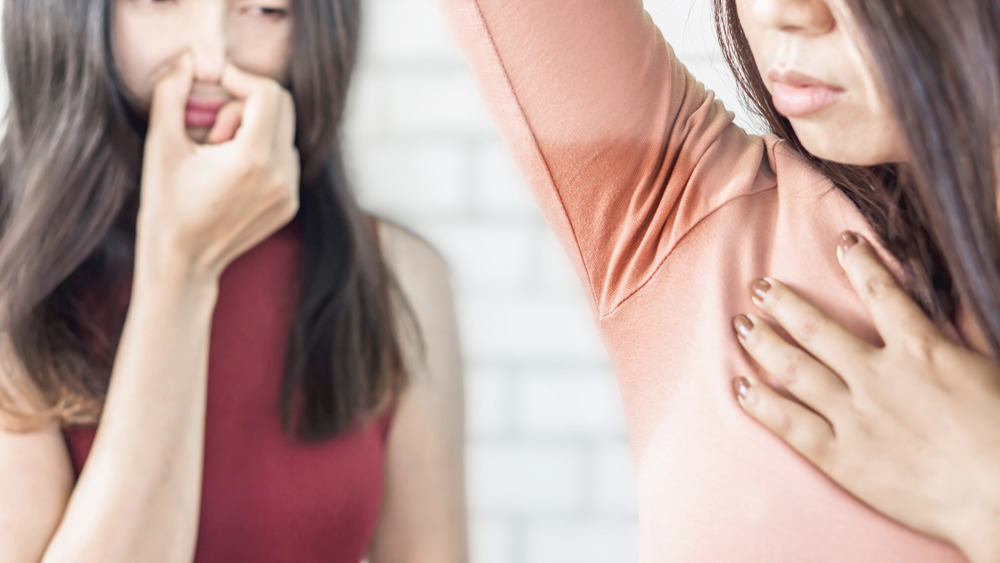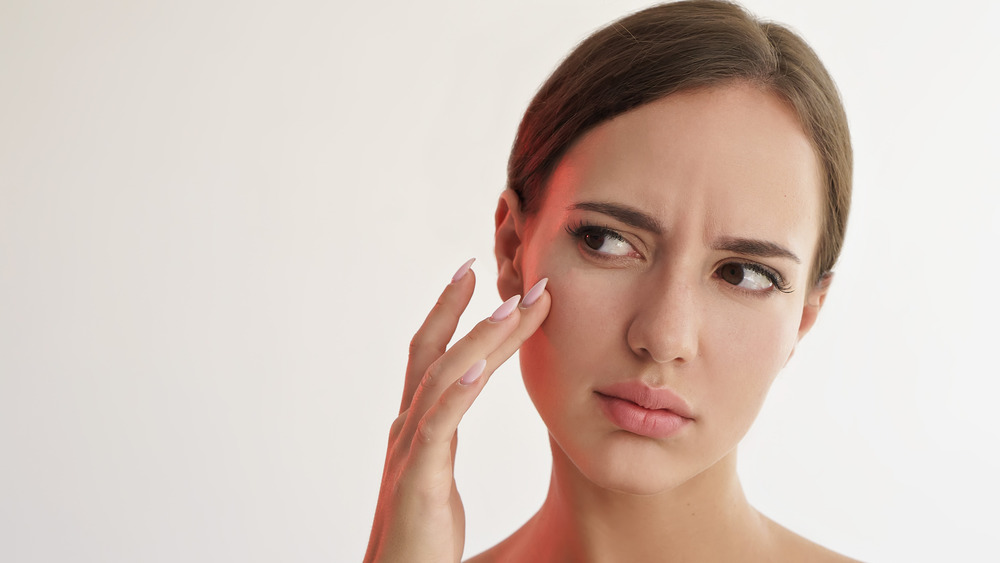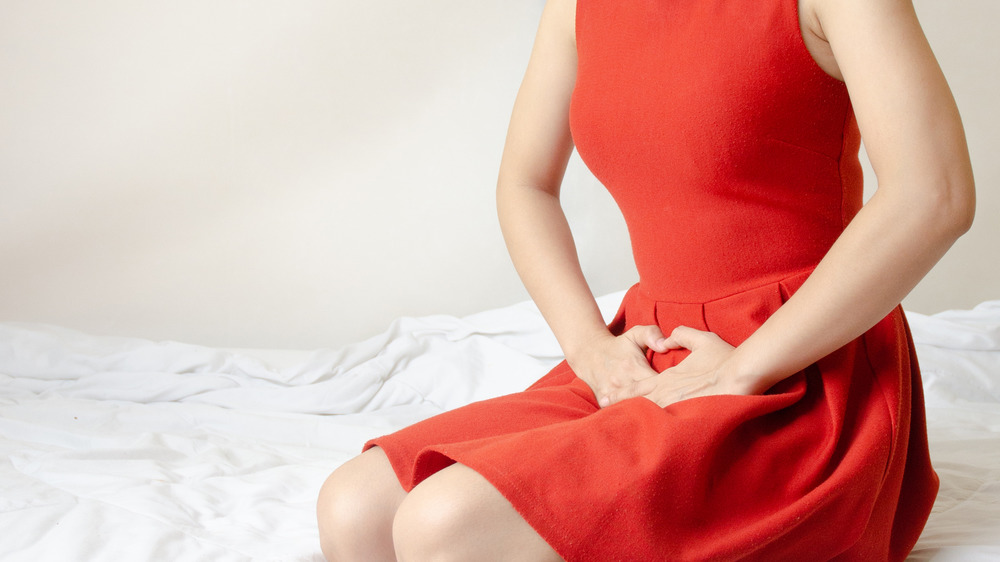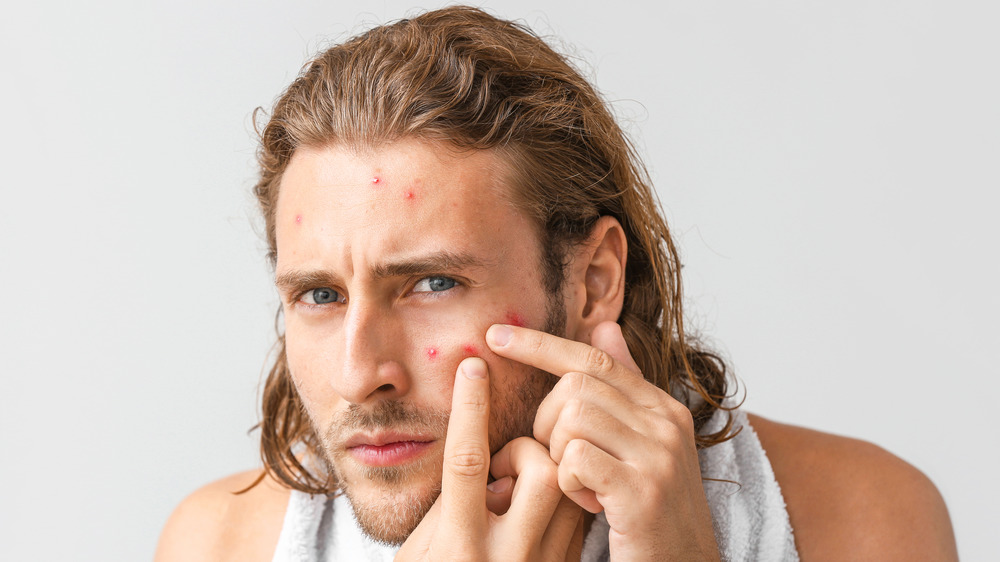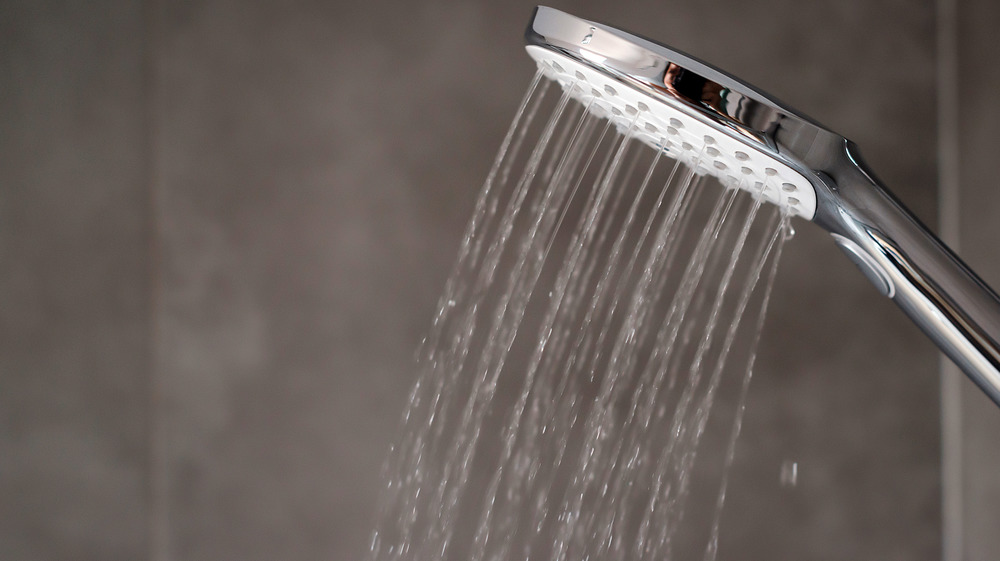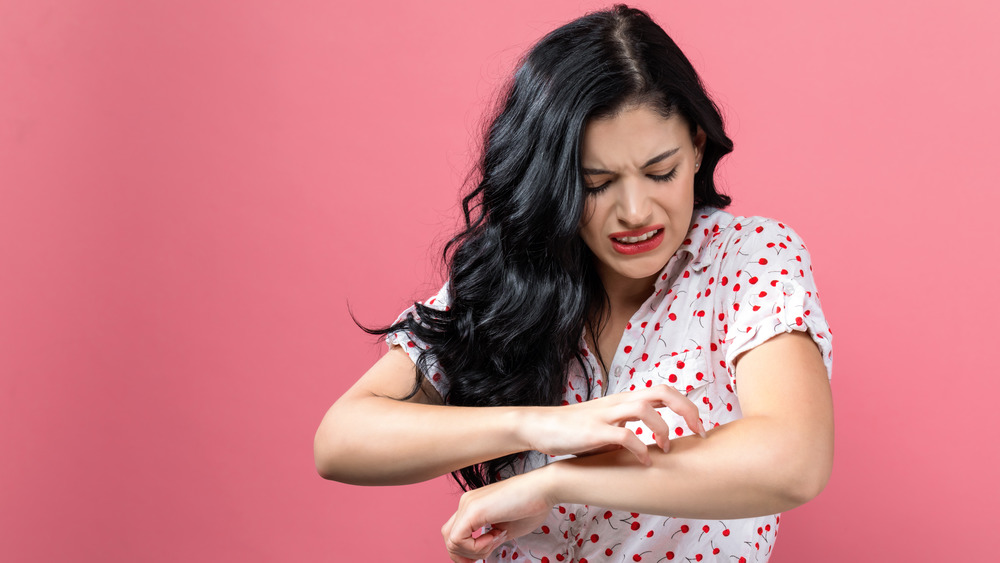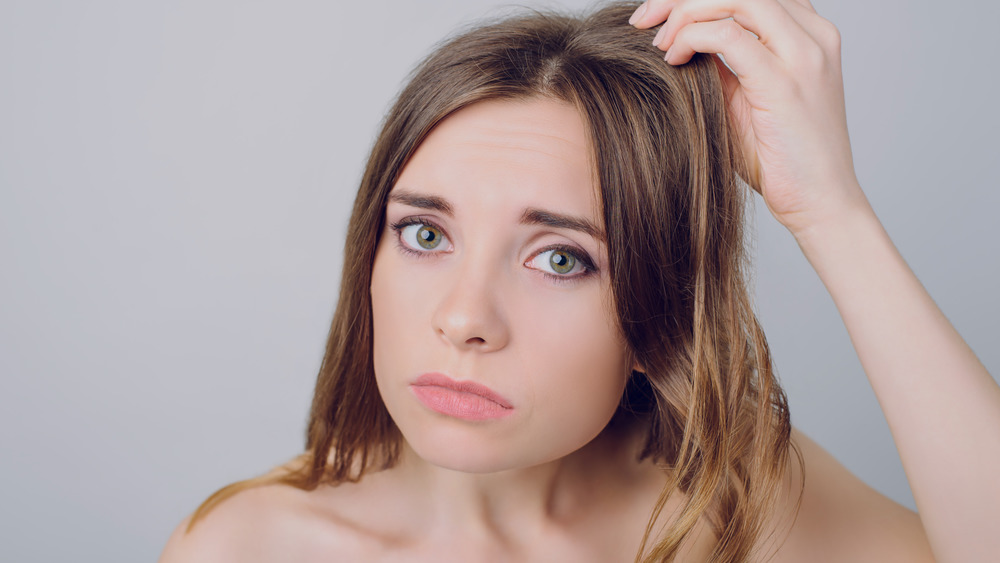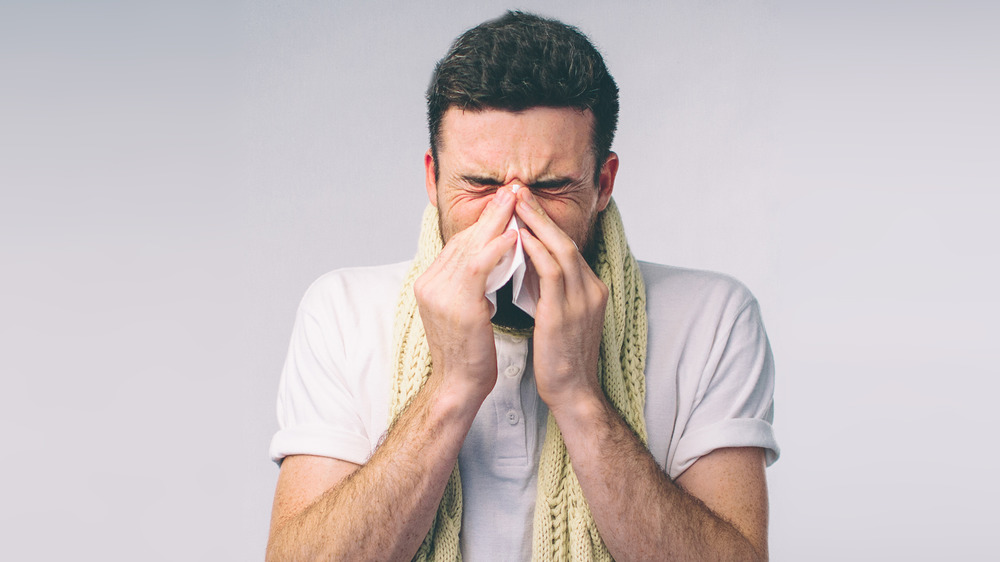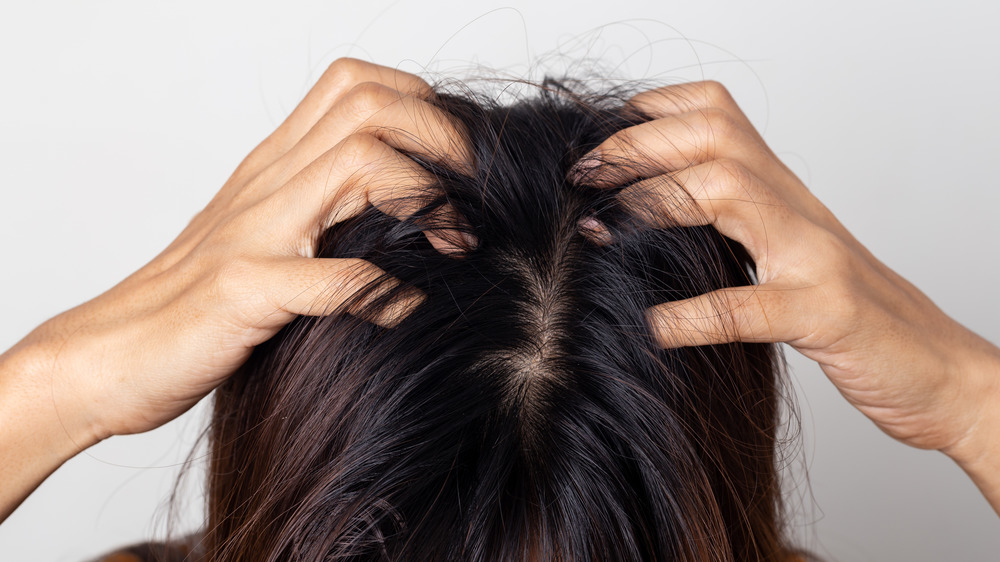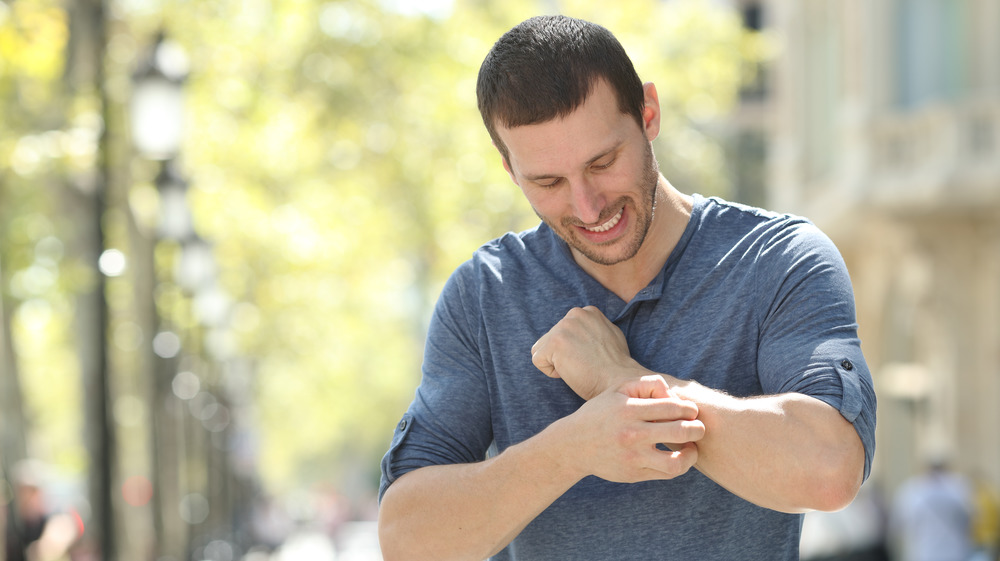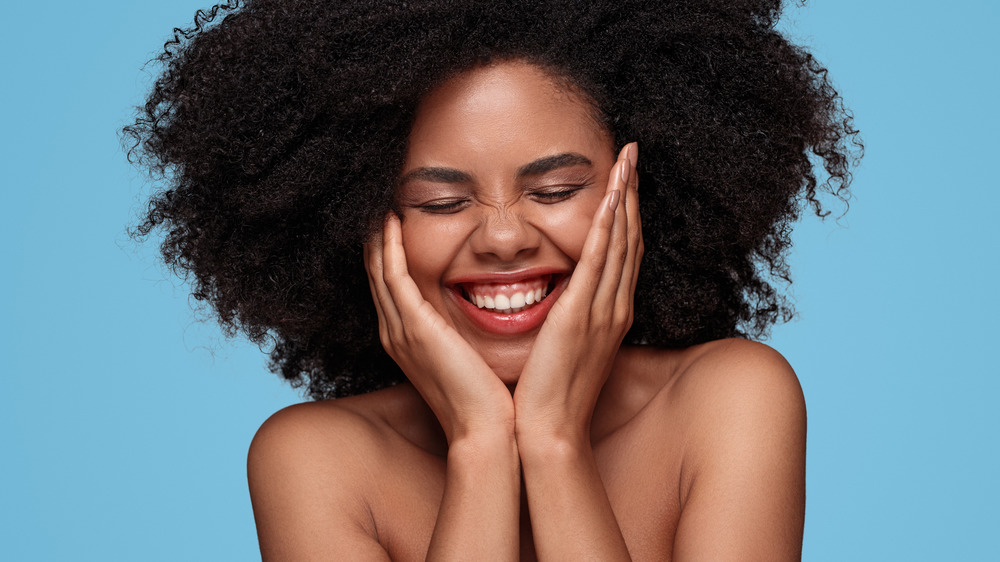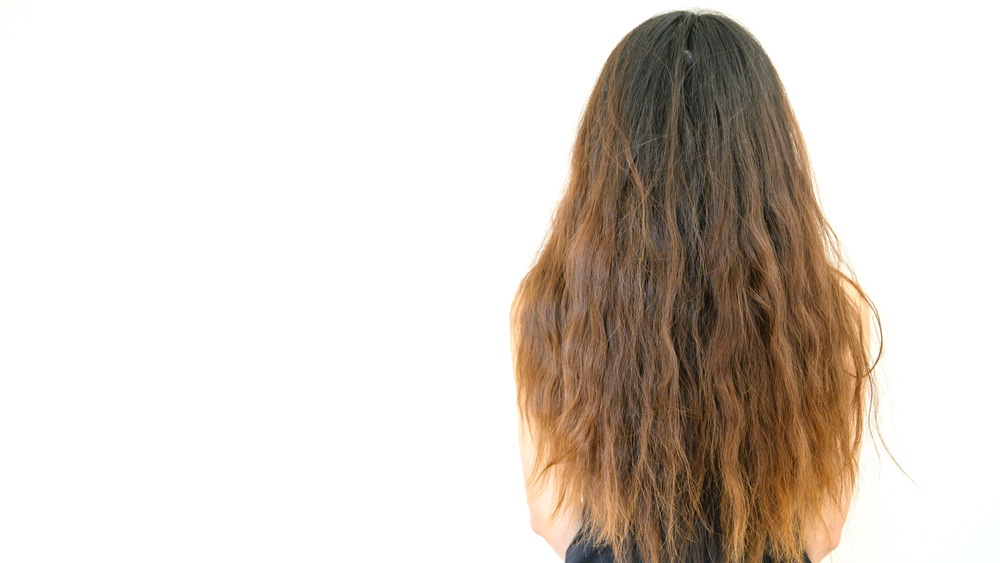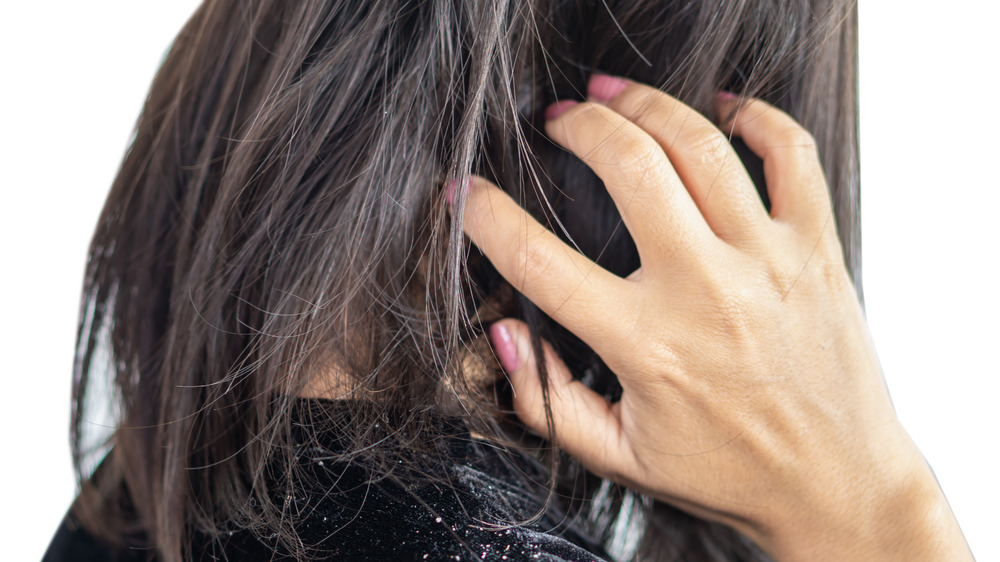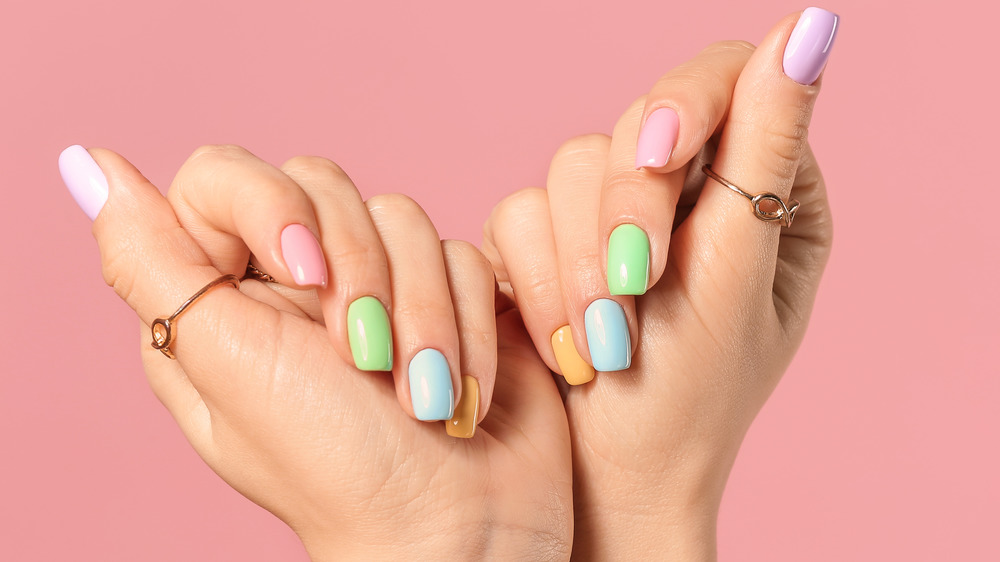When You Stop Showering, This Is What Happens To You
Nothing beats showering after a long day of work or an intense workout. As if you're wiping away both the grime and the day's stress, taking a shower can be a relaxing experience. But does showering translate to getting clean?
"We come in contact with thousands of allergens every day. Showering rinses off those allergens, as well as bacteria and viruses," dermatologist Shilpi Khetarpal told the Cleveland Clinic. Yet, some experts say there's no added benefit to showering every day. "When it comes to concerns about health, however, it's not at all clear that a daily shower accomplishes much," Dr. Robert Shmerling, the clinical chief of rheumatology at Beth Israel Deaconess Medical Center at Harvard Medical School, told Considerable. "In fact, a daily shower may even be bad for your health." This raises the question: What would happen if we stopped showering? Here's a look.
You will discover your natural scent when you stop showering
When you start skipping showers, the most noticeable effect will be a strong body odor. While a shower would normally wash away the odor-causing bacteria, the bacteria will now linger and break down sweat in the apocrine glands, which have many proteins, according to Medical News Today. The apocrine gland is located in certain parts of the body, including the armpits, groin, and face. And as Healthline explained, you should clean these areas daily.
While you might have people scooting the next chair over, your stench won't last forever. In The Atlantic, physician James Hamblin wrote about his own experience with giving up showering and remarked how his smell changed over time. "After a while, the idea goes, your ecosystem reaches a steady state, and you stop smelling bad. I mean, you don't smell like rosewater or Axe Body Spray, but you don't smell like B.O., either," he explained. "You just smell like a person."
Hamblin believes cleaning goes against evolution. "If we do more to allow our oil glands and bacteria to equilibrate, the theory goes, skin should stop fluctuating between oily and dry," he continued.
Dark patches on your skin may arise after you quit showering
If you see blotches on your skin after giving up showering, they may be more than dirt. Medical News Today explained that not cleaning your skin regularly can produce dark patches called dermatitis neglecta. Our bodies regularly create new cells and shed as many as 40,000 skin cells per day, according to Verywell Health.
Regular bathing helps to remove the excess dead cells and prevent flaking of the skin. When you don't shower, Medical News Today explained, the dead skin cells can accumulate with other components such as sweat, oil, dirt, smoke, and germs to make the skin dark, scabby, and callous. If poor hygiene persists, secondary infections — especially ones that cause the skin to crack and bleed — can arise from dermatitis neglecta.
Dermatitis neglecta is treatable, according to Medical News Today. Cleaning up affected areas with alcohol or antibacterial wipes can eliminate the brown plaques. Only in severe cases will you have to see a doctor for dermatological treatment.
When you stop showering, your risk of jock itch increases
Jock itch is a fungal infection that may make it difficult for you to stop scratching yourself — especially in areas where you sweat, such as the inner thighs and buttocks, explained Alberta Health Services.
"Keeping moist, salty sweat soaked clothing close to your skin for long periods after working out leads to irritation and the increased risk of small abrasions or skin breakdown," Holly L. Phillips, a women's health physician and medical contributor to CBS News in New York City, told Women's Health. "This can raise your risk of bacterial and fungal infections, like staph bacteria or the fungus that causes jock itch."
Even if you ditch the sweaty clothes immediately, you really shouldn't ditch the post-workout shower. "It's not the smell of sweat that you have to worry about but the fact that perspiration left behind on your skin allows bacteria to proliferate," Phillips continued.
Not showering can trigger acne breakouts
Along with the smelly body odor comes the risk of acne. According to Verywell Health, not showering causes dead skin cells and other bacteria to accumulate on the skin. Excessive amounts of dead skin cells and oil, Verywell Health explained, can get trapped in pores. These blockages can cause blackheads or, if bacteria is introduced, inflamed acne. For this reason, the publication recommends washing your face daily, even when you shower less often.
However, acne isn't just limited to the face. "Sweating and humidity can aggravate breakouts by giving the bacteria on the skin a better environment to grow," said David Lortscher, dermatologist and Curology founder, to Well+Good. "Restrictive, tight clothing, like athletic clothing can also contribute, as sources of friction can aggravate acne as well, which is why we often see acne in women that occurs along the line of a sports bra."
When you give up showering, you may get a yeast infection
While body odor may lessen after a period of not showering, there's a yeast called Candida albicans waiting to move into your private areas. This bacteria causes yeast infections, a type of fungal infection that affects up to three out of four women in their lifetime, per the Mayo Clinic. And "yes, men can get yeast infections, too," physician Patricio C. Gargollo, confirmed.
Yeast infections thrive in humid and moist places, per Healthline. When you don't shower every day, you're opening the doors for the Candida bacteria to settle in. Not one to be a rude houseguest, yeast infections come with several unwanted gifts, including watery cottage-cheese looking discharge, redness and swelling of the genitals, and a burning sensation during urination.
To avoid recurring yeast infections, Healthline recommended three simple steps: "Wear cotton underwear and loose clothing. Take daily showers. Wash and sterilize any clothing and towels you used during your infection."
Fungus may grow on your skin if you give up showering
As if straight out of a low-budget sci-fi movie, a germ invasion can occur in the absence of frequent showering. Germs not only take over — they also produce fungus. "We all have good bacteria that lives on our skin. But if you don't help out the good bacteria by washing and exfoliating, dead skin cells accumulate, creating a medium for bacterial or fungal overgrowth, infection, and inability to fight the bad bacteria and fungus we encounter," said Janette Nesheiwat, a family and emergency medicine physician, to Bustle.
This doesn't mean you need to scrub your skin raw, but there's a case to be made for showering often. "If you work out or live in a hot climate, your body will perspire more and sweat needs to be washed off, or else acne, folliculitis, fungus and yeast infections may develop," dermatologist Estee Williams told Simplemost. "The best advice is to shower weekly for a baby, twice a week for a young child, and at least every other day for adolescents and adults. Shower after every workout and daily during the summer."
Your hair will start to feel greasy after you skip a couple showers
When you don't shower enough, your hair starts to get oily, which may make you feel self-conscious, according to Healthline. Oily hair comes from the sebaceous glands that live in your hair. When your hair is dirty and dry, these glands release an oily substance called sebum to moisturize the hair, the site explained.
"If you don't wash your hair every two to three days you will get a greasy, oily buildup," George Rylander, a master stylist at New York City-based Dop Dop Salon, told Women's Health. "Your hair will look and feel dirty and start to smell as it takes in the smells of the environment."
Healthline explained that washing your hair once a day is necessary for people prone to greasy hair. But avoid washing your hair more frequently than that. This can cause your glands to produce more oil in response to the extra shampoo, according to the site.
Showering can prevent your immune system from doing its job
A common reason to take showers is to be clean and healthy, but the sick irony is that you may be making yourself sicker. According to Harvard Health Blog, the immune system needs to be exposed to microorganisms to develop an "immune memory." This is important in having the immune system quickly mount an immune response to a foreign invader that may harm the body.
"The immune system is composed of cells and organs that help prevent and fight infection," said Ysabel Montemayor, a registered dietitian, to Bustle. "It is important to strengthen it to lower the chances of getting sick." Although this may mean you can replace your daily shower with an every-other-day shower, this doesn't mean you should roll around in the dirt and never wash yourself off.
"Although increased bacteria exposure may play a role in strengthening immunity, it could also be very dangerous," Montemayor continued. "Poor hygiene can spread and expose you to dangerous bacteria, increasing the risk of infections."
You can ruin your scalp health by giving up showers
Taking care of your scalp is a juggling act. When you wash your hair too much, you risk damaging your scalp and hair. And when you don't wash your hair enough, well, you risk damaging your scalp and hair.
"A total lack of moisture from stripping oils can also cause a dry, flaky scalp and as your scalp dries out so does your hair," hairstylist Tonya Le said of too frequent hair washings in an interview with Insider. This can lead to an itchy scalp, according to the Cleveland Clinic. In turn, a dry, itchy scalp "can lead to increased hair shedding," said dermatologist Shilpi Khetarpal to the Cleveland Clinic. And don't think about picking your dry scalp. "If you then pick at those flakes or scrape at them, you can even end up damaging your hair follicles, which could lead to hair loss," Niket Sonpal, an internist and professor at Touro College in New York City, to Bustle.
Now, if you don't wash your hair enough, you can incur buildup on your scalp, which may negatively affect your hair growth, Angela Lamb, a board-certified dermatologist, told USA Today. In addition, not washing your hair for an extended period of time increases the risk of developing ringworm of the scalp, explained Medline Plus.
You risk eczema flare-ups when you start skipping showers
Eczema is more than a rash. The National Eczema Association describes eczema and atopic dermatitis — a more severe type of eczema — as a condition in which the body is losing moisture. The lack of moisture means there's not a lot of oil to lubricate the skin. This dry skin then weakens the skin barrier, the upper layer of skin, which protects the body from bacteria, allergens, and other invading pathogens.
While constant exposures to harsh soap and chemicals can irritate eczema further, the National Eczema Association explained that taking a bath or shower at least once a day can help retain moisture and prevent dry skin. Even if you don't want to shower, spending a few minutes under the water can help, according to Everyday Health.
"It's counterintuitive because people think showering removes moisture from the skin. But for people with eczema, it's important to take daily showers to get rid of allergens and bacteria," Shilpi Khetarpal, a dermatologist, told the Cleveland Clinic.
When you stop showering daily, you retain more good bacteria on your skin
If you were to ask someone the most important part of the body, they might say the heart or the brain. However, the real answer may not be inside your body but rather outside. Skin is the unsung hero and largest organ in the body. The uppermost layer of skin acts as a physical barrier to prevent water loss and protect against outside pathogens that can harm the body and cause infection, explained Healthline.
However, not all bacteria are detrimental to human health. A 2018 review in Nature explained that the skin barrier wouldn't be possible without some good bacteria that evolved to live and work with the skin to defend against dangerous invaders. They also warn the immune system of potentially harmful germs. But the skin isn't impenetrable, and showering too much can make it weaker.
"You can deplete the essential oils, lipids, and bacteria that help your skin fight off inflammation, maintain a smooth look and reinforce its protective barrier," Dr. Niket Sonpal, an internist and professor at Touro College in New York City, told Bustle.
Your hair will be less frizzy if you stop showering so often
Your hair will thank you for skipping a hair wash now and then. According to Healthline, oils in the hair called sebum are essential in keeping hair shiny and moisturized, and it is especially important in keeping curled hair soft and not frizzy. However, excessive shampooing can wash off sebum.
Many shampoos also contain sulfates, which are strong detergents that cause hair to dry out and become frizzy, Dana Boyer, a New York-based hairstylist, told HuffPost. "If people didn't rely on these detergents so much the quality of people's skin would probably be better, especially as people get older," integrative dermatologist Elizabeth Hughes told Healthline. "People in their 40s and 50s who are still washing their hair and scrubbing themselves as if they were teenagers are really damaging their skin [and hair]. It takes a long time to fix that."
If you're dealing with constant frizz, you may want to consider cutting back on how often you wash your hair and utilize moisturizing hair products. Such products "help restore the hair cuticles by making them more soft, manageable and, most important, luscious," celebrity hairstylist Tonya Le told Insider.
When you stop showering, you risk having more dandruff
Oily hair's BFF dandruff is never too far behind. While there can be different reasons for dandruff, according to Medical News Today, a common one is excess oils. "It's a common misconception that dandruff is caused by dryness; in reality, it's usually due to an overgrowth of a harmless yeast," Jessica Wu, a dermatologist and assistant clinical professor of dermatology at the University of Southern California Medical School, told Everyday Health. "In some people, the yeast starts to feed on the excess oil and dead skin cells on the scalp, causing the skin cells to shed more frequently and clump into flakes."
Dandruff appears to be the exception to washing your hair once a day. "Not shampooing enough will only make your dandruff worse — it causes more oil and dead skin cells to accumulate on your scalp, which the yeast and fungi just continue to feed on," said Stuart H. Kaplan, a dermatologist in Beverly Hills, explained to Everyday Health.
Healthline advised that people with dandruff wash their hair with a shampoo that contains either zinc pyrithione, which eliminates bacteria and fungus, or salicylic acid, which reduces the extra oil and flakiness.
Your manicure will last longer if you give up showering
After treating yourself to a nice manicure at the spa, the last thing you want is chipped nails. But exposing your manicure to constant water can cause just that. According to Michigan Medicine, a constant lathering of water, soaps, and other chemicals in products can dry out your nails. This leads to soft and weak nails that split and peel. They advised moisturizing your hands with lotion and avoid having your hands in water too much. As such, forgoing your daily showers will likely lengthen the life of your manicure.
The likelihood of weak nails increases as we get older. "Our nails grow a little slower as we get older. Since it takes longer to grow out, the nail has more exposure to dry air, water and sanitizers," said Rosemary Keskinen, a dermatologist, to the Cleveland Clinic.
However, this shouldn't stop you from washing your hands — or showering — when needed. The Cleveland Clinic explained that washing your hands and showering is necessary to protect against bacteria and viruses.

